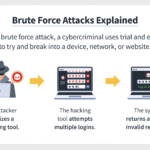Cryptography, often perceived as a mere tool for securing information, transcends its foundational purpose. While many associate its usage predominantly with data protection and privacy, there exist more profound objectives that delineate its significance in contemporary society. Cryptography operates at the intersection of secrecy, authority, and trust, creating a complex web of implications that extend beyond mere information security. This article endeavors to elucidate the multifaceted goals underpinning cryptography, whilst also contemplating the societal intricacies that inspire an enduring fascination with this arcane discipline.
At its core, the primary objective of cryptography is to safeguard information from unauthorized access. This aspect is paramount in an era characterized by relentless cyber threats and the rampant proliferation of sensitive data across digital landscapes. By harnessing cryptographic principles, organizations can employ encryption algorithms to obfuscate data, ensuring that only individuals possessing the requisite decryption keys can access the underlying content. This transactional safeguard is crucial for maintaining confidentiality, which remains an unequivocal pillar in the realm of information governance.
Yet, confidentiality alone scarcely represents the entirety of cryptography’s aspirations. Integrity, as a concurrent objective, ensures that the information remains unaltered during transmission or storage. Cryptographic techniques such as hash functions are instrumental in verifying the authenticity of data. When combined with digital signatures, they enable a user to ascertain whether an object has been tampered with. This commitment to maintaining information integrity promotes accountability and trust among stakeholders, an increasingly vital currency in today’s interconnected world.
Moreover, the concept of authentication emerges as another pivotal function of cryptography. By confirming the identity of users, cryptography fortifies the legitimacy of transactions and communications. Authentication processes often utilize public key infrastructures (PKI) to validate identities, preventing impersonation and unwelcomed intrusions. This not only fortifies individual privacy but also enhances organizational security protocols, thereby mitigating vulnerabilities to various forms of cyber interference.
Nevertheless, cryptography is not merely a shield; it embodies a medium through which trust can be cultivated in digital interactions. The asymmetric nature of public-key cryptography, in particular, entrusts users with the ability to communicate securely without pre-established relationships. This paradigm shift has engendered unprecedented opportunities for secure exchanges in an otherwise anonymous digital milieu. Trust, frequently touted as the backbone of commerce and communication, finds reinforcement through cryptographic measures that facilitate secure transactions, thus contributing to the expansion of e-commerce ecosystems.
As one delves deeper, it becomes apparent that the very existence of cryptography invites philosophical ponderings on autonomy and control. In an epoch where digital footprints linger perpetually, many individuals find themselves grappling with issues surrounding their own data privacy. The capability to encrypt personal communications empowers users, offering them an agency that counters the exploitative tendencies of third-party entities. As individuals increasingly recognize their vulnerability in a hyper-connected environment, their engagement with cryptographic practices becomes a means of reclaiming power over their digital selves.
In addition to the protection of individual data, cryptography serves as a bulwark against state surveillance and authoritarianism. History amplifies this narrative, illustrating instances where oppressive regimes have sought to curtail dissent. Cryptographic tools allow activists and dissidents to evade oppressive oversight, facilitating the exchange of information that challenges oppressive structures. The historical context of cryptography as a symbol of resistance elucidates the profound implications it carries, extending its relevance beyond mere technical applications.
From a practical standpoint, as organizations navigate intricate regulatory landscapes, cryptography emerges as an essential component for compliance. Many international regulations mandate robust security standards to protect sensitive information, particularly in sectors such as finance and healthcare. By implementing cryptographic protocols, organizations not only adhere to legal obligations but also bolster their reputation and trustworthiness within the marketplace. This regulatory intersection further elucidates the essential role cryptography plays in nurturing legitimacy and accountability.
The implications of cryptography are not restricted to established technologies; they also shape the evolution of emerging paradigms such as blockchain and decentralized finance (DeFi). The underpinnings of cryptography fuel these innovations, providing the structural integrity that renders them functional. As such, a fascination with cryptography intensifies, as individuals and organizations alike continue to explore its transformative potential in reimagining traditional systems of finance, governance, and beyond.
In conclusion, while the foundational principles of cryptography pivot around confidentiality, integrity, and authentication, the objectives extend into deeper realms of trust, autonomy, and resistance against oppression. The complexities of this field invite continuous exploration and appreciation, as cryptography not only defines the safeguarding of data but also shapes societal values and structures. In an era where the lines between the personal and the public, the secure and the vulnerable, are increasingly blurry, the real objectives of cryptography reveal layers of meaning that resonate profoundly across the tapestry of our digital lives.








Leave a Comment